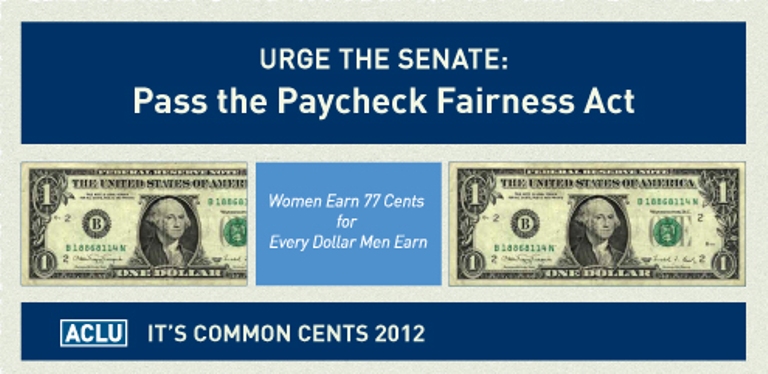
Last week, testified before the about pay discrimination. In her nine year career as a pharmaceutical sales rep, Kelly was extremely successfulÔÇöone of the best-performing reps in the nation. But despite all her hard work, she knew that she was being paid far less than another employee hired around the same time and in the same position: her husband. Because her employer had a policy in place prohibiting employees from either asking about or sharing information about their wages, Kelly was only able to find out that she was being discriminated against because she happened to be married to her coworker.
Terri KellyÔÇÖs situation is unique, but the pay secrecy policy enforced at her workplace is not. According to the Institute for WomenÔÇÖs Policy Research, of American workplaces either discourage or specifically prohibit employees from discussing pay practices. ThatÔÇÖs one of the biggest challenges in fighting pay discrimination. For most women, itÔÇÖs nearly impossible to find out whether discrimination is occurring.
Imagine the Catch 22 women are in. Workers often remain in the dark because of these prohibitions. So if you are already worried about possible discrimination in your paycheck, you have to risk getting no paycheck - in other words, you have to risk getting fired - if you want to try and do something about it.
Stories like KellyÔÇÖs have spurred growing concern in both chambers about womenÔÇÖs economic security. Last month, members of the Senate held a to address the critical issue of equal pay, and now the Senate is moving quickly to pass the , which is scheduled for a cloture vote on the Senate floor tomorrow.
The would put an end to pay secrecy policies like the one Kelly faced, by prohibiting retaliation against employees who inquire about their employers' wage practices or disclose their own pay to colleagues. It would also make a number of other long-needed reforms to the Equal Pay Act to close loopholes that have made the law less effective over time, such as requiring employers to demonstrate that disparities in pay between men and women working the same job result from factors other than sex, and strengthening penalties for equal pay violations.
And thereÔÇÖs no question that itÔÇÖs the Paycheck Fairness Act is needed. after passage of the of 1963, women still make only 77 cents for every dollar earned by men. The is even greater for women of color. Over time, those lost cents on the dollar add up to serious money: for Kelly, the gap between her salary and her husbandÔÇÖs salary added up to a loss of $65,000 in income over the course of nine years.
The legislation passed the House of Representatives with overwhelming bipartisan support in 2009, but fell just two votes short of moving forward in the Senate in 2010, in spite of majority support from Senators. In 2012, itÔÇÖs time for the Senate to finally seize the opportunity to pass this historic bill to help ensure economic security for millions of American families who simply canÔÇÖt wait any longer to take home the pay they have rightfully earned.
Tomorrow, the Senate will vote on cloture for the Paycheck Fairness Act. You can by urging your Senator to vote YES on the Paycheck Fairness Act today.
Learn more about pay discrimination: Sign up for breaking news alerts, , and .

